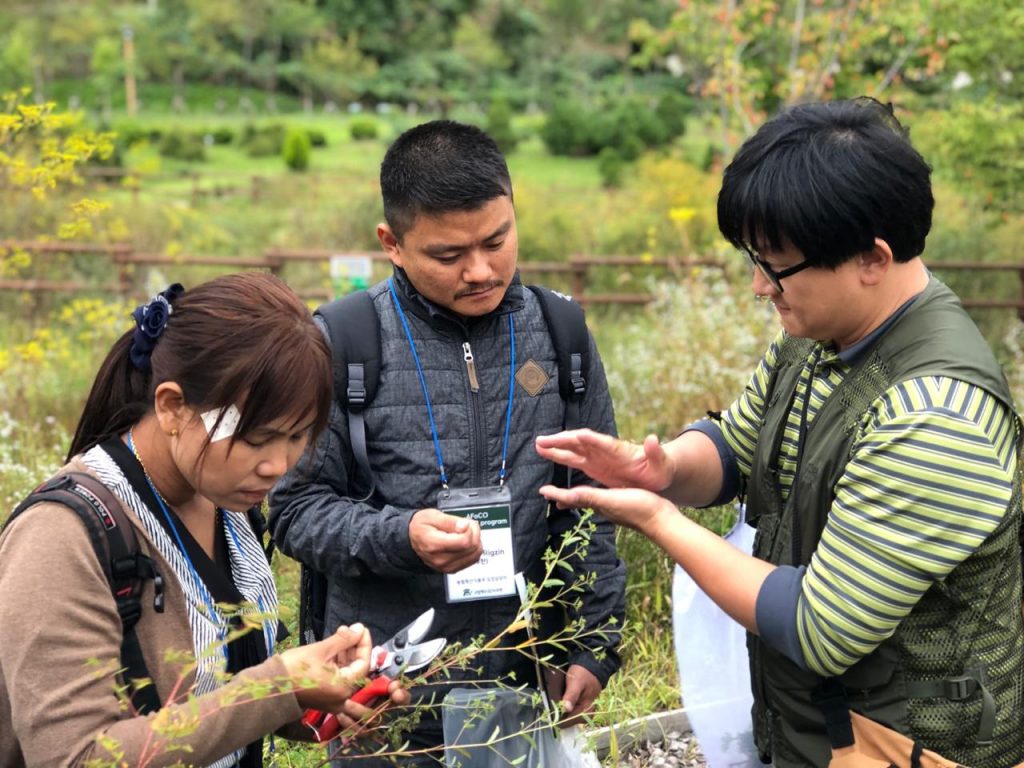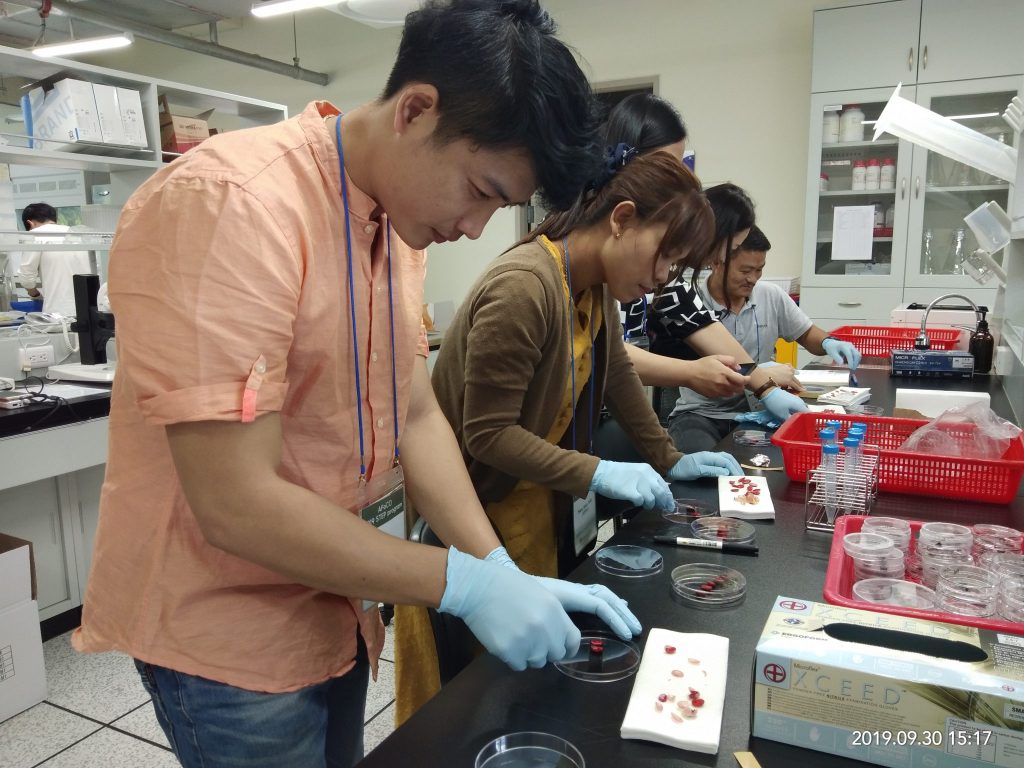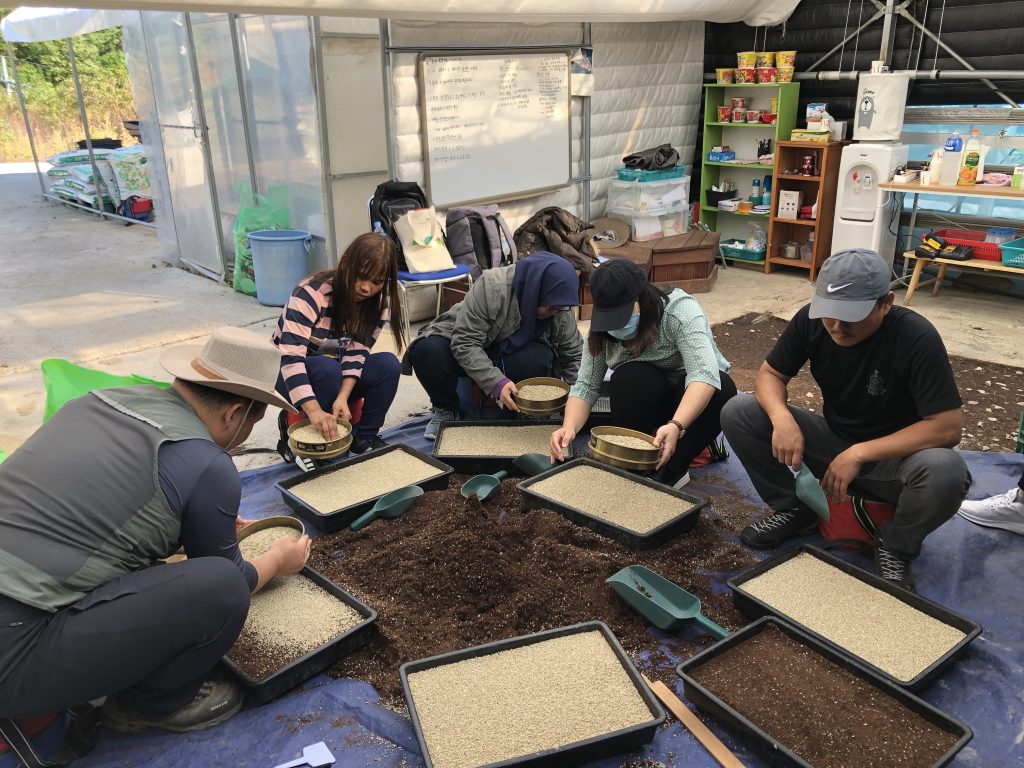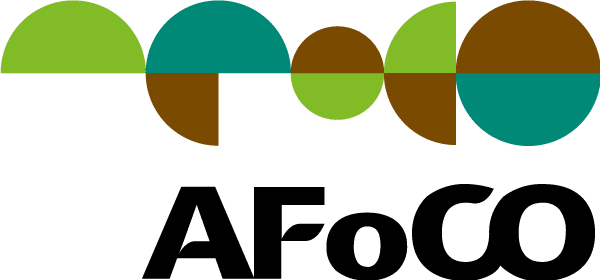Interviews with the participants of the 2019 AFoCO STEP Program on ‘The Role of Arboretums in the Conservation of Forest Plant Biodiversity‘
September 2019 marked the launch of AFoCO’s first Science and Technology Partnership (STEP) Program. Five officials embarked on a month-long research immersion program at the Baekdu-daegan National Arboretum (BDNA) in North Gyeongsan Province of Korea. Hear what the AFoCO STEP Program participants have to say about their experience!

What did you learn during your time at the BDNA?
“During the 1-month course, we got to learn about the importance of reforestation as well as ex-situ conservation of several endangered plant species such as the Pinus sp. We were introduced to the different steps of reforestation for better ex-situ conservation. Additionally, processes regarding seed collection, seed bank storage and seed vault management are also essential as such practices can take you another step further towards the conservation of wild/native plant seeds.”
– Ms. Nurul Hazlina, Brunei Darussalam
“We learned about the systematic management of seeds and practiced carrying out procedures such as seed collection, cleaning, counting, measuring moisture content, germination tests and seed X-ray analysis. We were also introduced to nursery technologies and tissue culture. If disseminated through staff training, the skills and knowledge learned can help improve seed management in Myanmar and will be useful in our seed conservation program.”
– Ms. Swe Swe Win, Myanmar

Tell us about some of the activities that you enjoyed!
“Learning about seed storage and visiting the Seed Vault of the BDNA was a very interesting experience for me. that have the big seed vault and it also can store the seeds in the world. We can send the seed to keep there for safety. In the future, should we lose any species, we can request for that species and obtain the variety for germination.”
– Mr. Meng Loth, Cambodia
“One of the most important and interesting activity, which I thoroughly enjoyed was learning about the Baekdudaegan Global Seed Vault. Since BDGSV being the only facility in the world which serves as both a seed bank and a seed vault, I believe that storing seeds in BDGSV would be a win-win situation for both the organizations when we talk about future conservation and preservation of our plant genetic resources.”
– Mr. Kencho Rigzin, Bhutan
“One of the most memorable activities during our training was our visit to the Sabang Memorial Park in Pohang, the Siberian Tiger Forest as well as to one of the only three seed vaults in the world – the Baekdudaegan Global Seed Vault. These visits inspired me and taught me about the possibilities of reforestation, protection, and conservation of different resources such as that of Siberian tigers and seeds of the world. ”
– Ms. Nurul Hazlina, Brunei Darussalam

How do you think you can apply what you have learned at the STEP Program in your home country?
“Tissue culture the most important activity of the program because we can learn about how to make mediums for seed, tree cutting, callus, plant. In the IRD of Cambodia, we also have a tissue culture laboratory, but we lack the capacity to carry out tissue culture. In some places, it is not easy to find a parent plant which produces good seeds for storage. Hence, although tissue culture is important for research on callus, our research attempts are mostly unsuccessful. I hope that in the future, AFoCO will train participants from Cambodia on tissue culture on tropical seedlings that use callus and subculture to help enhance our research capabilities in this area.”
– Mr. Meng Loth, Cambodia
“I think that all of the contents in the 2019 AFoCO STEP program can be applied to many countries in Asia, especially Vietnam. I am especially interested in the seed management protocol employed at BDNA including seed collection, seed cleaning, seed characteristic investigation, seed morphology investigation, seed viability test. We had many opportunities to participate in hands-on activities such as assessing the moisture content of seeds and seed size, doing seed germination test, using the microscope to measure the width and length of seeds, constructing a 3D seed image, observing and determining seed quality through X-ray test and Tetrazolium test. In Vietnam, my institute has a seed store that stores more than 10,000 seed lots of plus trees. However, we are only able to conduct germination tests to check the germination rate of seeds. In the future, I hope we will have a chance to carry out X-ray tests and Tetrazolium tests as these methods are more time-saving and cost-effective.”
– Ms. Trieu Thi Thu Ha, Viet Nam
“The theories and skills gained can definitely be applied in Brunei even though the focus species and environmental conditions are different. Several applications that can be applied in Brunei include the seed collection and storage project with BDNA, improvement on nursery and Internet of Things (IOT), which allows one to remotely control the environmental conditions in a nursery. Furthermore, there is also plant biotechnology and tissue culture that can be applied in research on economically and medicinally important as well as rare, endemic and endangered native plant species for mass production and ex-situ conservation purposes.”
– Ms. Nurul Hazlina, Brunei Darussalam
INFORMATION ON AFoCO STEP PROGRAM

